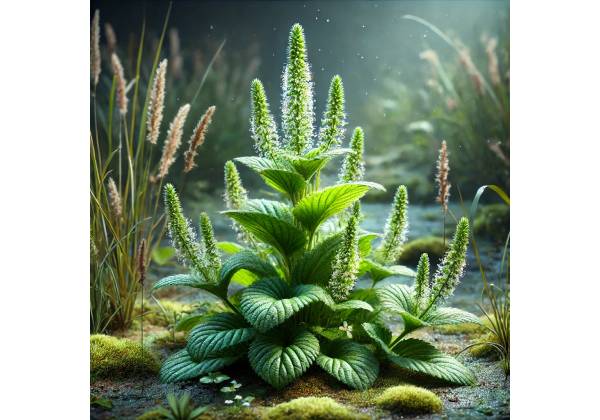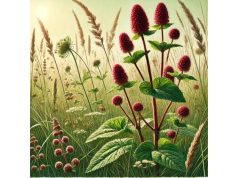
Bugleweed is the common name for a group of plants in the Lycopus genus, with Lycopus europaeus and Lycopus virginicus among the most recognized species. Although it may look unassuming at first glance—being a low-growing herb often found near wetlands—bugleweed has drawn attention in herbal circles for centuries. In various traditions, people have turned to bugleweed for help with mild thyroid issues, bleeding management, and as a general toning herb for the circulatory system. It’s also sometimes called “gypsywort,” a nod to folklore that claims traveling communities once used the plant for fabric dye or mild medicinal needs.
Where bugleweed truly stands out is in how it intertwines a subtle astringent action with possible endocrine impacts. Some herbalists, for instance, see it as a helpful ally for calming certain thyroid imbalances or dampening the occasional heart flutter. Meanwhile, ecologists notice bugleweed because it flourishes in damp soils along the edges of streams and ponds, forming a quiet but consistent part of local wetland ecosystems. Though it’s not among the most famous herbs out there, bugleweed’s centuries of usage—and the growing body of research that underscores its intriguing properties—makes it worth a closer look for anyone curious about lesser-known botanical allies.
Below are some of the top highlights often tied to bugleweed:
- May help moderate excessive thyroid activity
- Potential to gently reduce mild bleeding (astringent effect)
- Traditionally used to soothe rapid heart rate or mild palpitations
- Sometimes employed in calming or sedation contexts
- Contains unique active compounds like lithospermic acid
Table of Contents
- Bugleweed Botanical Overview and Identification
- Tracing Bugleweed’s Path Through History and Tradition
- Phytochemistry and Active Compounds in Bugleweed
- Bugleweed Health Benefits: A Closer Look
- Key Properties That Define Bugleweed
- Bugleweed Uses, Practical Applications, and Safety Notes
- Scientific Research and Significant Studies on Bugleweed
- Bugleweed FAQ
Bugleweed Botanical Overview and Identification
Bugleweed is part of the mint family (Lamiaceae), though it’s easy to overlook if you’re not paying close attention. Native to North America and parts of Europe and Asia, the genus Lycopus includes various perennial herbs that thrive near moist habitats like rivers, streams, ponds, or low-lying fields. Their preference for damp conditions leads to them often forming small clusters in wetlands, especially where other competition might be limited by the watery soil.
General Plant Structure
- Stems and Leaves
- Bugleweed typically has a square stem, consistent with many mint-family plants. The leaves often have serrated or lobed edges and can appear opposite along the stem.
- Depending on the species, leaves might be elongated with slightly purple-tinged undersides. Some folks describe them as “tapered lances,” especially in Lycopus virginicus.
- Height and Growth Pattern
- Bugleweed rarely grows very tall—often staying between 0.5 and 2 feet. However, it can form dense mats in ideal conditions.
- In partial sun or bright shade, the plant can become leggy. In stronger sun (provided it has enough moisture), it remains more compact.
- Flowers
- Small, pale flowers—white or light pink—appear in whorled clusters around the leaf axils. They’re not showy but are enough to attract pollinators like small bees or flies.
- Each flower can produce tiny seeds that can drift in watery areas or remain near the plant if conditions favor new growth.
- Rhizomes and Spread
- Some bugleweed species spread via underground rhizomes, forming colonies over time. This helps the plant persist in favorable damp soils.
Where It Thrives
- Moist, Wetlands, or Damp Soils
Bugleweed is commonly encountered in meadows with consistent water supply, near the edges of streams, or occasionally in irrigation ditches that remain wet. - Partial Shade or Full Sun
It tolerates both, as long as the ground remains moist. In strong sun, the plant needs enough water to stay healthy, while partial shade can suit it just fine in moderate climates. - Temperate Zones
The distribution of Lycopus species typically aligns with temperate regions across North America and Eurasia. Certain species might be region-specific—for example, Lycopus europaeus in Europe, Lycopus virginicus in the eastern U.S.
Confusion with Other Mint Family Plants
- Stachys or Mentha Relatives
Many mint-family members feature similar square stems or opposite leaves, but bugleweed’s habitat inclination for watery spots, along with small white flowers and specific leaf shape, helps differentiate it. - Self-Heal (Prunella vulgaris)
Another moist-area mint, but self-heal has more noticeable purple flower clusters at the top, while bugleweed’s flowers are smaller and appear along the stem.
Key Identification Tips
- Look for Square Stems: Gently rolling the stem between your fingers reveals edges—classic mint family trait.
- Check Flower Position: The modest blooms in the leaf axils is a bugleweed hallmark, in contrast to some mints that produce terminal flower spikes.
- Moist Environment: If you’re trekking near a marsh or a creek, keep an eye out for these subtle, lightly flowering stems.
- Slender Leaves with Tooth-Like Edges: Leaves often have shallow lobes or pointed serrations along their margins.
Knowing these clues helps ensure you correctly identify bugleweed if you’re exploring wetlands or foraging for herbal studies. After all, the plant’s subtlety in both appearance and effect means it’s easy to miss unless you’re specifically on the lookout. Yet once recognized, bugleweed stands out for its delicate beauty and the surprising punch packed inside its slender leaves and stems.
Tracing Bugleweed’s Path Through History and Tradition
Though bugleweed might not be as instantly famous as other herbs, its use in folk medicine spans different cultures, from North America’s indigenous communities to various European herbal traditions. Historically, bugleweed often played a role in toning or calming certain bodily systems and was revered enough to feature in early herbals and local lore.
Early Mentions in European Texts
- Medieval Records
- European species like Lycopus europaeus occasionally appear in older herbals, though overshadowed by more commonly known species (e.g., mint, sage). Those references sometimes speak of bugleweed’s “cooling” effect on the body, hinting at usage for fevers or overheated conditions.
- Monastic Herbal Gardens
- In some monastic contexts, smaller amounts of bugleweed might have been cultivated for mild respiratory or circulatory support. Yet, it never quite achieved the widespread recognition of thyme or rosemary.
Native American and North American Pioneer Use
- Indigenous Communities
- Some North American tribes recognized local bugleweed (like Lycopus virginicus) for controlling minor bleeding or for direct application on small wounds. Typically, they used the crushed fresh leaves or a weak infusion.
- Because the plant is found near water, it was easily available for communities living by rivers or marshy terrains.
- Colonial and Frontier Herbalism
- European settlers discovered that local bugleweed sometimes eased mild heart palpitations or reined in mild bleeding issues, thanks to its astringent properties. The usage remained niche but was recorded in some diaries and minor herbal references.
- Naming Confusion
- The term “gypsywort” in some older records might lead to confusion, as the name came from speculation that certain traveling groups used the plant for dyeing fabrics. These accounts vary and might not be thoroughly documented.
Emergence in More Formal Herbal Circles
- 19th-Century Eclectic Medicine
- In the U.S., “eclectic physicians” sometimes prescribed bugleweed for hyperthyroid symptoms or palpitations. They found it helpful for individuals showing signs of an overactive thyroid.
- While the data was anecdotal, the repeated mention in these circles hints that bugleweed developed a mild but consistent reputation for thyroid calming.
- Gradual Recognition in Europe
- By the late 19th and early 20th centuries, some German or British herbals included bugleweed as an option for mild thyrotoxicosis. Its usage was overshadowed by stronger pharmaceuticals that emerged, but it remained in the background for “milder cases.”
Modern Rediscovery and Niche Appeal
- Thyroid Support
- Modern herbal enthusiasts sometimes incorporate bugleweed extracts or tinctures for borderline hyperthyroid or overactive metabolism scenarios, seeking gentler interventions than prescription medication. This remains an alternative or complementary approach, best done under professional guidance.
- Mild Sedative or Tranquilizing Effects
- Some herbal references mention bugleweed as slightly soothing to the nervous system. However, it’s rarely used as a primary sedative, overshadowed by stronger herbs like valerian or passionflower.
- Limited Commercial Market
- Bugleweed is not mass-produced like St. John’s wort or echinacea. Products do exist (tinctures, dried herb, or sometimes capsules) in specialized herbal stores or from smaller-scale suppliers. It’s not mainstream, partly due to the modest demand and partly due to the complexities of dosage or standardization.
Intertwining with Other Herbs
- Combination Formulas
Historically and presently, herbal practitioners might pair bugleweed with motherwort or lemon balm for synergy in addressing mild thyroid-related or heart palpitations issues. The idea is that each herb offers complementary calming or balancing effects. - Shift in Popularity
As modern medicine advanced, reliance on bugleweed for thyroid management decreased significantly. However, the recent wave of interest in natural solutions or integrative approaches has spurred some renewed attention.
Cultural Footnotes
- Dyeing Clothing
Folklore about “gypsies” using the plant to color linen or garments a dark hue might have contributed to the moniker “gypsywort,” though direct, detailed historical records remain patchy. - Name Confusions
The label “bugleweed” is occasionally used for other plants (like some Ajuga species). This underscores the importance of scientific naming (i.e., Lycopus) when referencing potential medicinal usage.
In short, bugleweed’s story is one of modest but persistent usage across time—never achieving superstar herbal status, but never quite disappearing, either. Its mild yet noticeable influences on the cardiovascular and endocrine systems carved out a steady niche among herbalists who prefer gentler plant-based interventions. Today, it’s recognized as a niche solution for certain concerns, backed by centuries of anecdotal experience and a modest but consistent presence in the herbal pharmacopeia.
Phytochemistry and Active Compounds in Bugleweed
One reason bugleweed intrigues herbal practitioners lies in its distinct chemical makeup. The Lycopus genus is known for carrying compounds that can influence thyroid function, among other bodily systems. By zooming in on these compounds, we can see why bugleweed has earned a place in certain specialized herbal formulas.
Major Identifiable Components
- Diterpenes and Triterpenes
- These molecules contribute to some of bugleweed’s subtle endocrine actions. In particular, certain terpenes might help reduce excessive thyroid hormone production or release, although the precise mechanism remains under study.
- Phenolic Acids
- Compounds like rosmarinic acid (common in many mint relatives) can appear in bugleweed leaves. They might offer mild antioxidant or anti-inflammatory benefits.
- Labiates
- As a member of the mint family, bugleweed potentially shares some typical mint-labiates that exhibit mild antibacterial or antiviral properties in lab settings. This has yet to be thoroughly confirmed for Lycopus species specifically.
Thyroid-Influencing Substances
- Lithospermic Acid
- Arguably the star player, lithospermic acid is often cited as the reason bugleweed might help modulate an overactive thyroid. This compound can bind with certain thyroid-related enzymes or hinder the conversion of T4 to T3, though the effect in humans at typical herbal doses is still not comprehensively proven in large trials.
- Alkaloids?
- Some references mention minor alkaloids in bugleweed. However, their role or significance in thyroid modulation is not well established. They might be overshadowed by the more researched phenolic compounds.
Astringent Constituents
- Tannins
Bugleweed’s astringent effect is likely due to tannins. Tannins can help tighten tissues and reduce fluid excretion or bleeding. In folk usage, that’s a reason bugleweed was sometimes turned to for mild hemorrhage or to help dry up lactation in postpartum cases. However, no strong modern data confirm these applications.
Volatile Oils
- Trace Aromatic Elements
While many mint family plants are recognized for significant essential oils, bugleweed’s aroma is relatively subtle. The plant may still house minor volatile components but not in amounts that typically lead to steam-distilled essential oil on the commercial market.
Coumarins and Flavonoids
- Coumarin Derivatives
Certain species in the mint family contain coumarin-like substances that can mildly anticoagulate blood in large doses. However, bugleweed’s coumarin content is likely minimal, if present at all, so it’s rarely a factor for normal usage. - Flavonoids
The presence of lesser-known flavonoids can further supply antioxidant or vasoprotective benefits. Even if they’re in moderate concentrations, synergy with other compounds might still shape bugleweed’s overall effect.
Impact of Environmental Factors
- Soil and Climate
As with many herbs, the concentration of these constituents can vary widely depending on local conditions—water availability, soil fertility, sunlight exposure. That’s part of why commercial standardization is trickier for plants like bugleweed. - Harvest Timing
Some studies on other minted species demonstrate how harvest stage influences compound levels (e.g., more phenolics at flowering). For bugleweed, best practice might be to collect leaves or aerial parts around flowering for a balanced chemical profile, though specifics can vary among herbalists.
Relationship to Mechanisms of Action
- Thyroid Dampening
Many believe that lithospermic acid and possibly other terpenes hamper the body’s ability to produce or convert active thyroid hormones, offering relief from mild hyperthyroid issues. - Calming Heart Rate
If an overactive thyroid partially triggers a racing heart, an herb that reduces thyroid hormone levels can indirectly calm palpitations. Additionally, bugleweed’s mild sedative or soothing properties might come from synergy among multiple compounds.
Research vs. Tradition
- Lack of Large Trials
While in vitro or small animal studies highlight bugleweed’s potential to influence thyroid hormones, large-scale human RCTs remain scarce. That’s a cautionary point for those wanting definitive proof. - Consistent Folk Observations
Despite limited formal data, the repeated mention in historical and modern herbal contexts for hyperthyroid-like discomfort suggests enough anecdotal success to keep bugleweed in moderate use.
All told, bugleweed’s unique standing rests on these specialized phenolic and terpene compounds that appear to help quiet an overactive thyroid and supply mild astringent or sedative properties. The synergy within bugleweed—like many herbs—likely stems from multiple chemicals working together, rather than a single “miracle molecule.” If you’re investigating bugleweed for personal or professional reasons, focusing on reputable sourcing and standardized extracts (where available) can help ensure you get a consistent phytochemical profile to tap into these intriguing benefits.
Bugleweed Health Benefits: A Closer Look
Although bugleweed remains under the radar compared to mainstream herbs like peppermint or ginger, a handful of its reputed benefits keeps it alive in certain herbal traditions. Whether you’re dealing with mild hyperthyroidism symptoms, a racing heartbeat, or general anxiety, bugleweed has historically been seen as a subtle ally. Let’s break down these potential benefits.
1. Thyroid-Modulating Support
- Mild Hyperthyroid Management
People occasionally use bugleweed if they exhibit signs of an overactive thyroid—such as restlessness, elevated heart rate, or mild goiter. It’s believed that certain compounds help slow or reduce thyroid hormone production. - Less Intense than Mainstream Drugs
Individuals might turn to bugleweed if they’re not at a stage requiring prescription medication or are exploring complementary care. Still, self-medication with bugleweed for a confirmed hyperthyroid condition should be done with professional supervision due to potential complexities.
2. Soothing Heart Palpitations
- Calming the Cardiovascular System
Given that an overactive thyroid can speed heart rate, bugleweed’s anti-thyroid effect may indirectly stabilize palpitations. Some references say it also acts as a mild sedative on the nervous or circulatory system. - Short-Term Relief
Users mention short-term improvement in comfort, but results vary widely. It’s not a cure for arrhythmias or structural heart problems.
3. Astringent Properties
- Mild Hemostatic Action
Traditional texts talk about bugleweed’s ability to reduce mild bleeding, from gum issues to nosebleeds. It might have been employed topically in weak infusions or compresses. - Menstrual Flow Moderation
Some herbal references describe bugleweed’s potential to lightly reduce heavy menstrual flow, though robust data is lacking.
4. Sedative or Relaxant
- Subtle Nervine
Occasionally labeled as a nervine or mild relaxant, bugleweed may help in moments of heightened stress or mild anxiety, particularly if related to overactive thyroid. It’s not on par with stronger tranquilizers but might act gently for certain individuals.
5. Traditional Use for “Night Sweats” or Mild Fevers
- Heat-Reducing Folklore
Because of bugleweed’s classification as a “cooling” or “cold” herb in older energetic models, it might have been used for nighttime sweating or low-grade fevers. This usage is less common in modern contexts.
6. Culinary or Food-Related?
- Rarely Eaten
Bugleweed typically isn’t used as a culinary herb. Its mild bitterness and specialized properties relegate it to medicinal or cosmetic contexts, if at all. - Possible Infusion
An herbal infusion or tea might deliver mild benefits, but the flavor is typically described as earthy or slightly bitter, so sweeteners or complementary herbs might help.
7. Contemporary or Future Potential
- Holistic Endocrine Support
As interest in alternative endocrine approaches grows, bugleweed might see renewed attention, especially if future research clarifies safe dosing for thyroid issues. - Formulas with Lemon Balm or Motherwort
Some practitioners combine bugleweed with lemon balm or motherwort for synergy, aiming to address stress, mild palpitations, or thyroid balancing from multiple angles.
Cautionary Perspective
- Not for Hypothyroidism
If your thyroid is already underactive, bugleweed’s potential to reduce thyroid hormone output can worsen that condition. - Potential Overuse
Excessive or prolonged usage might overly suppress thyroid function, leading to fatigue, weight changes, or other hypothyroid-like symptoms. - Professional Guidance
Because the difference between mild improvement and detrimental hormone suppression can be narrow, it’s wise to involve a healthcare provider before using bugleweed for thyroid concerns.
In summary, bugleweed’s health claims revolve around gentle but notable action in contexts of mild hyperthyroidism, occasional heart palpitations, or limited astringent needs. The extent and reliability of these effects can depend on the individual’s condition, the herb’s preparation, and concurrent therapies. While a segment of the herbal community vouches for bugleweed’s subtle power, mainstream medicine typically urges caution. Nevertheless, if approached responsibly with professional input, bugleweed can be a quiet herbal companion that edges the body toward equilibrium in specific scenarios.
Key Properties That Define Bugleweed
Though bugleweed might not grab the spotlight in most home gardens, it does hold a distinctive suite of traits beyond just “a plant that dampens thyroid function.” From how it shapes local habitats to the physical qualities herbalists appreciate, let’s examine the broader scope of bugleweed’s properties.
1. Preference for Damp and Marshy Environments
- Moisture-Loving
Bugleweed belongs among those wetland species that flourish where water supply is abundant or soils remain saturated. This might be along streams, lakes, or in marshy meadows. - Ecological Role
In many regions, bugleweed provides habitat cover for small aquatic or amphibious wildlife. Its thick stands can help stabilize the banks of waterways, reducing erosion.
2. Subtle Aesthetic
- Soft, Whorled Flowers
The clusters of pale flowers forming around leaf nodes might not catch your eye as a “showstopper,” but they do have a gentle charm, adding a delicate accent to watery landscapes. - Low-Key Landscape Use
Gardeners who cultivate bog or water gardens occasionally keep bugleweed for a natural, unpretentious look.
3. Astringent and Bittersweet Flavor
- Mildly Bitter Taste
The leaves contain certain tannins and other compounds, giving them a bitter, astringent flavor. This can be masked in tincture form or softened by blending with palatable herbs if used in a tea. - Minimal Culinary Potential
Because of the bitterness and potential endocrine effects, bugleweed rarely sees a place in the kitchen.
4. Light Sedative or Relaxant Overtones
- Subdued Nervine Quality
Some herbal texts mention bugleweed for its capacity to calm. This likely stems from synergy among its various compounds, though it’s overshadowed by better-known relaxing herbs like chamomile or valerian. - Pairings
In formulas that aim to relax both mind and body, bugleweed might partner with lemon balm, motherwort, or passionflower, balancing each other’s flavors and effects.
5. Anti-Thyroid Nuance
- Lithospermic Acid
The presence of this and possibly other constituents underpins bugleweed’s reputation as a thyroid modulator. This property is unique among many mint-family herbs, setting bugleweed apart from typical “culinary mints.”
6. Minimal Toxin or Allergen Risk
- Relatively Safe for Short Use
Overall, bugleweed is not known for intense toxicity. The main caution is its effect on the thyroid, rather than common allergic or toxic concerns. - Potential for Mild Skin Irritation
Some individuals might find the leaf’s juice or latex (if any) irritating, but recorded cases are rare.
7. Ease of Cultivation
- Simple to Grow in Wet Soil
Gardeners with wetlands or consistently damp corners find bugleweed fairly easy to maintain, as it doesn’t require special soil amendments beyond moisture. - Potential Spread
In the right conditions, it can self-seed or spread via rhizomes. However, it’s nowhere near as invasive as certain other mint relatives like creeping Charlie or purple loosestrife.
8. Low Commercial Profile
- Niche Herb
Because not many people cultivate bugleweed for large-scale production, product availability is narrower compared to mainstream herbs. Tinctures or dried cut-and-sifted bugleweed might appear in specialized herbal stores or from smaller suppliers. - Less Standardization
If you buy bugleweed extracts, each batch’s anthocyanin or lithospermic acid content can fluctuate. This is unlike some standardized herbal products with labeled active compound percentages.
Collectively, these properties help shape bugleweed’s identity as a gentle, water-loving herb with mild sedation and potential thyroid-balancing aspects. It’s not the typical “kitchen companion” but can be a calm presence in a water feature or a targeted herb in a specialized remedy. For those intrigued by plants that quietly do their job in the background, bugleweed offers an understated complexity and a touch of watery elegance in the garden or the herbal arsenal.
Bugleweed Uses, Practical Applications, and Safety Notes
If bugleweed’s subtle thyme-like leaves and reputed thyroid benefits have piqued your interest, you might wonder: “How can I actually use it, and is it safe?” The short answer is that, for certain mild conditions—especially around thyroid concerns—bugleweed may offer gentle support. But, like any herb that can influence hormone levels or bodily functions, it demands a measured approach.
1. Herbal Preparations and Forms
- Tinctures
- One of the most common forms available in herb shops, made by steeping bugleweed in an alcohol solvent. Tinctures concentrate the plant’s active compounds.
- Dosing typically calls for a few drops to half a teaspoon daily, but wide variations exist. Many practitioners recommend starting low.
- Infusions or Teas
- Dried bugleweed leaves and aerial parts can be brewed in hot water for 10–15 minutes. This yields a slightly bitter tea that is sometimes combined with sweeter or aromatic herbs like spearmint or lemon balm.
- However, the water-based extract might be weaker in certain thyroid-active compounds compared to an alcohol-based tincture.
- Capsules or Powders
- Less common, but you might find freeze-dried bugleweed in encapsulated form from specialized suppliers. Capsule instructions often mention short-term usage, and possibly limiting to 2–3 daily.
- Topical Use
- Historically, mild poultices or washes for small wounds or to reduce minor bleeding were occasionally mentioned. Nowadays, this is rarely practiced, overshadowed by more proven topical herbs.
2. Combining Bugleweed with Other Herbs
- Motherwort
- In certain herbal traditions, bugleweed and motherwort team up to address mild heart palpitations. The synergy might result from bugleweed’s potential to calm the thyroid and motherwort’s known effect on anxious or stressed hearts.
- Lemon Balm
- Another herb known for mild sedation, lemon balm can help offset bugleweed’s bitterness while complementing a calming effect. This pairing is sometimes recommended for people with racing minds at bedtime.
- Valerian or Passionflower
- If the goal is stronger sedation or sleep support, bugleweed might only be a small portion of the formula, overshadowed by heavier “sleep herbs.” This combination is more theoretical than widely used.
3. Practical Guidelines for Use
- Consult a Professional
- Because bugleweed can influence thyroid function, discussing it with an herbalist or an integrative healthcare provider is crucial—especially if you suspect or know you have a thyroid condition.
- If you’re on medication for hyperthyroidism or hypothyroidism, bugleweed could interfere with dosage needs.
- Short-Term or Occasional
- It’s typically advised not to use bugleweed indefinitely. If you’re employing it for mild hyperthyroid symptoms, you might try it for a few weeks to see if it provides relief, then reassess.
- Consistent check-ins or lab tests can help ensure you’re not suppressing thyroid function too much.
- Start Low, Observe
- A smaller dose—like half or a quarter of recommended tincture amounts—lets you gauge your body’s response. Negative effects, if any, might include fatigue, lowered energy, or signs of hypothyroidism.
4. Safety and Contraindications
- Pregnancy and Breastfeeding
- Many herbal references caution avoiding bugleweed during pregnancy or nursing because it can reduce milk production and also because of its potential endocrine impacts.
- Thorough data are limited, so it’s generally recommended to skip bugleweed in these phases.
- Pre-Existing Hypothyroidism
- If your thyroid is underactive, bugleweed’s thyroid-suppressing effect could worsen the issue. So it’s best avoided, or used only if a knowledgeable provider specifically recommends it under strict conditions.
- Medication Interactions
- People on thyroid hormone replacements (like levothyroxine) or other endocrine drugs should be especially cautious. If you do decide to use bugleweed, consult your doctor or pharmacist for potential interactions or timing to avoid absorption conflicts.
- Allergic Reactions
- While not widely documented, an individual can always be allergic to a new herb. Monitor for rashes, swelling, or respiratory distress if you’re trying bugleweed for the first time.
5. Harvesting and Storage
- Where and When to Collect
- If you’re a forager, gather bugleweed from clean wetlands, typically when the plant is in bloom or just before. Make sure you’re certain of the ID—confusing it with other watery minted plants might cause confusion.
- Avoid areas with known pollution or agricultural runoff, as the plant will absorb contaminants from the water.
- Drying
- Spread the stems or leaves in a single layer in a shady, airy spot. Once fully dry, store them in sealed jars away from heat or sunlight. If used for tinctures, proceed promptly with fresh or partially dried material, depending on the recipe.
- Shelf Life
- Like many herbs, dried bugleweed typically stays viable for up to a year if stored well. Tinctures can last longer (often 2+ years) due to the preservative aspect of alcohol.
6. Integrating into Daily Life
- Mild Evening Tea
If you’re exploring bugleweed’s calming side, a small infusion at night might help ease tension. Just be mindful of dosage and potential bitterness—adding honey or pairing with a floral herb can improve taste. - Addressing Minor Palpitations
Some individuals keep a bugleweed tincture on hand, taking a few drops when feeling fluttery. This approach is anecdotal and not a replacement for medical evaluation if heart issues are significant. - Infrequent vs. Regular
Because of bugleweed’s possible impact on hormone levels, many prefer occasional usage over daily ingestion. If you have a known condition, structured regimens with professional oversight are best.
Bugleweed’s principal usage focuses on mild hyperthyroid-like discomfort, occasional palpitations, or local astringent needs. More of a supportive or short-term herb than a daily staple, it exemplifies how certain plants can help in small but meaningful ways—provided we keep an eye on dosage, synergy, and potential hormone implications. Approach bugleweed with care, clarity on your health status, and a willingness to adjust if the body signals it’s not a good fit.
Scientific Research and Significant Studies on Bugleweed
Though bugleweed remains a relatively niche herb, particularly compared to major players like echinacea or ginseng, a modest body of research has explored its biological activities—especially around thyroid function. Here’s an overview of the studies and findings that shape current understanding of bugleweed’s potential.
1. Early Botanical Investigations
- 19th-Century Pharmacognosy
Botanists in the late 1800s documented Lycopus species’ morphological traits and rudimentary chemical profiles. They noted the presence of pungent or slightly bitter compounds but didn’t isolate specifics beyond broad references to “resinous matter.” - Folk Observations
As with many herbs, the first “studies” were word-of-mouth or in local treatises, describing usage for goiter or heart palpitations. These lacked rigorous methodology but laid the groundwork for future curiosity.
2. In Vitro and Animal Model Studies
- Thyroid-Related Effects
- Some mid-20th-century lab experiments on rodents tested extracts of bugleweed, suggesting a possible reduction in T3 and T4 hormone levels. The extracts appeared to block certain enzymes that facilitate thyroid hormone production, though dosage precision was not well-defined.
- A 1970s study in Planta Medica reported that bugleweed extracts might slow thyroid enlargement in animals exposed to goitrogenic conditions. Yet the sample sizes and procedures were modest, calling for more data.
- Heart Rate Modulation
- Preliminary tests on isolated animal hearts indicated minor bradycardic effects (i.e., reduced heart rate) at higher concentrations. Researchers surmised this might correlate to mild sedation on the cardiac system, though in vivo significance required more exploration.
3. Clinical Observations in Humans
- Small Herbal Trials
A handful of small-scale observational trials or case series in Europe (circa 1980s–1990s) recounted improvements for individuals with subclinical hyperthyroidism or mild palpitations after using bugleweed tinctures. Typically, these involved fewer than 20 participants and lacked control groups. - Comparative Analyses
Occasionally, bugleweed was tested alongside motherwort or lemon balm, with each herb believed to address overactive metabolism. Findings suggested synergy, but the evidence was more anecdotal than rigorously statistical.
4. Modern Analytical Efforts
- Compound Identification
- More contemporary lab techniques (HPLC, mass spectrometry) have refined knowledge of bugleweed’s phenolic compounds, notably lithospermic acid. A 2005 paper in the Journal of Chromatographic Science established reliable methods for detecting and quantifying such constituents.
- Endocrine Mechanisms
- Researchers remain intrigued by how lithospermic acid might reduce TSH or T4/T3 levels in certain test systems. A 2012 in vitro study in the Journal of Endocrinology hypothesized that the compound modulates some thyroid receptor pathways, though they emphasized a need for larger animal or human trials.
5. Gaps and Next Steps
- Human RCTs
The gold standard—large-scale, double-blind, placebo-controlled studies—remains absent. Without them, even strong anecdotal or small observational data leaves bugleweed’s medical viability in the realm of possibility rather than certainty. - Standardization of Extracts
Future research might address consistent dosing. If bugleweed’s anthocyanins or phenolic contents vary from batch to batch, comparing outcomes across different trials is difficult. - Safety Profiling
We still need more robust toxicity profiles for varied populations—like pregnant individuals or those on multiple medications. Although caution is advised, definitive data is sparse.
Bugleweed FAQ
Is bugleweed safe for people with hypothyroidism?
Generally, no. Bugleweed is thought to reduce thyroid hormone levels, so using it if you already have low thyroid function (hypothyroidism) could exacerbate symptoms. Always consult a healthcare provider if you have any thyroid-related issues before trying this or any thyroid-influencing herb.
How do I prepare bugleweed for occasional use?
Many prefer a tincture (alcohol extract) because it can concentrate the plant’s active compounds. Dried leaves can also be brewed as a mild tea, though the flavor is somewhat bitter. Ensure you keep the dosage low and use bugleweed only for short periods unless guided by a qualified practitioner.
Can I grow bugleweed in my garden?
Yes, if you have consistently moist soil or a spot that remains damp. However, be aware that bugleweed can spread over time through rhizomes. It’s not typically invasive like some mint family members, but controlling it in a small garden might still require some maintenance.
Does bugleweed have any side effects apart from affecting thyroid levels?
Some people experience mild sedation or a reduction in heart rate, especially at higher doses. Occasional GI discomfort or allergic reactions could also occur. If you notice fatigue, dizziness, or unusual symptoms, discontinue use and talk to a medical professional.
Disclaimer
This article is provided for educational reasons only and should not serve as a substitute for professional medical advice. Always consult a qualified healthcare provider before making substantial changes to your diet, supplement routine, or herbal usage—particularly with an herb like bugleweed that can affect thyroid function.
If you found this information on Bugleweed useful, feel free to share the article on Facebook, X (formerly Twitter), or whichever social media platform you prefer. Helping others discover the possibilities and precautions of this understated herb can be a valuable step toward broader awareness and responsible herbal exploration!










